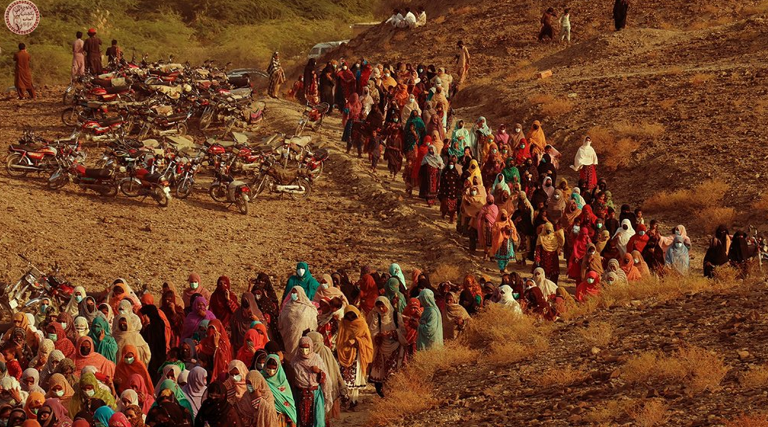
Karachi: “I know Islamabad will never do justice to Balochs,” said Dr. Mahrang Baloch, an activist leading the ‘March against Baloch Genocide’ from Turbat to Islamabad.
Mahrang is also the victim, as her father was abducted twice in 2006 and 2009. The body of her father, Abdul Ghaffar Lango, a prominent Baloch nationalist activist, was mutilated in 2011.
Bearing the scars of early experiences with the loss of a loved one and witnessing extrajudicial killing, when she spoke of her sorrows, they reflected through the depth of her eyes and in her voice.
“When you ask why my voice is harsh, I will tell you it is not harsh; it is sorrow that the state has inflicted on Balochistan since the first day of annexation with Pakistan,” she says.
In 2013, Mama Qadeer Baloch, the leader of Voice for Baloch Missing Persons (VBMP), had led a similar march from Quetta, through Karachi to Islamabad.
However, this year’s march – which began on December 6 – differs from the previous one as this time, the common Baloch people and victim families took the lead. Initially led by them, the march resulted in the killing of an innocent Baloch, Mola Baksh Baloch. Later, the kin of missing persons and Balochs affected by military operations in Balochistan joined the movement.
Balochistan has been grappling with a kill-and-dump policy for decades. One more incident of extrajudicial killing has prompted the people to raise their voices against the ongoing operation in the province. Local Balochs as well as international human rights organisations have broken their silence in support of the Baloch women’s protest in Islamabad.
On October 29, 2023, Balach Mola Baksh was sleeping at his home when security forces abducted him. Despite several efforts, the family struggled to file a first information report (FIR) regarding his disappearance.
After 23 days, on November 21, Pakistan’s Counter-Terrorism Department (CTD) presented Balach in Turbat’s court, securing a 10-day physical remand. However, within two days, CTD Balochistan reported Balach’s death in custody, along with three other missing persons.
Ajmal Mola Baksh Baloch, Balach’s brother, spoke to The Wire, saying that security forces barged into his house, abusing his family members despite their repeated inquiries about the reason for the torture. They forcibly took Balach without providing any information about the cause.
“We held hope that Balach would return and reunite with the family since he was presented in court. However, after two days, we received the devastating news of his murder,” said Ajmal. “That’s when we decided not to bury our brother until receive justice.”

Baloch women leading the march. Photo: Baloch Yakjehti Committee
Ajmal further shared that his family is too impoverished to afford meals, and some days they go without eating. The family has received threats from the security forces not to participate in the protest. “The CTD has a mandate to abduct and kill Balochs, and we can no longer tolerate such brutal actions,” he added.
The state’s fear over Balochs participating in the march
Refusing to bury Balach’s dead body and demanding justice, the family initiated a sit-in at Shaheed Fida Chowk. This protest evolved into the march against the Baloch Genocide on December 6 of this year. The Baloch Yakjehti Committee led the march. Mahrang told The Wire that it is not just a march, it’s a movement.
She is the main leader spearheading the march, and the majority of Baloch women have joined.
Mahrang shared that in her province, not a single house remains whose family member hasn’t faced enforced disappearance or been killed. What sets this march apart is that the Balach family refused to bury their son’s body, a decision that sent a strong message. The widespread participation of common people also turned it into a powerful march, reflecting the collective frustration with death squads, CTD, and enforced disappearances.
“In the state, being a Baloch is considered a sin, and we are being killed simply for being Baloch,” Mahrang said, with a sorrowful voice.
In addition to facing threats from the government and security forces, the march lacked financial support. The sole contribution from common people allowed the march to continue. Despite all the hurdles, when the government realised they could not quell the protest, they resorted to violence against it.
The march has made the following demands to Islamabad: the UN should send a fact-finding mission to investigate human rights abuses in Balochistan; the Balochistan CTD must admit its role in the fake encounter that led to Balach’s death; release all forcibly disappeared Balochs, especially those whose kin are present at the sit-in; and remove state-supported death squads.
The Ministry of Interior should issue an acknowledgment for enforced disappearances, conduct a press conference with the victims’ names, and stop filing fake FIRs against peaceful protesters.
The police tortured and beat protesters when they entered Islamabad
When the march entered Islamabad, the police prevented them from proceeding to the Islamabad Press Club, where other Baloch victim families were already waiting.
The protest was peaceful, yet the police created hurdles and blocked their path to the Press Club.
Consequently, the protesters held a protest on the road itself.
Mahrang announced that the Baloch victim families present at the Press Club should join them.

One of the kids holding a placard said, ‘I am also Mahrang. How many Mahrang can you arrest? Long live resistance.’ Photo: Wahab Baloch, activist.
Despite peaceful intentions, the police brutally arrested all protesters, sparking viral videos and global attention. The government, after using violence, tried to send them back to Quetta.
Baloch women questioned why they were not allowed to continue their peaceful protest. They asked: “Aren’t we citizens of the state?”
The protesters said that they would not return to Quetta until their demands were addressed, insisting on the release of all protesters and an end to the FIRs against them in both Islamabad and Balochistan.
Mahrang, who is now a symbol of resistance among the victims, said that Balochistan will not tolerate ruthless policies. She said that whenever the state attempts to oppress Balochs, they will return and peacefully resist. They will continue to expose the state’s violence, just as we did in Islamabad through the march.
Seema Baloch, a victim of forced disappearances, questioned the state’s response to their peaceful protest, saying, “How can they treat the missing persons, who are in their custody, with such brutality?”
The state commits genocide against Balochs and kills them in extrajudicial killing
The Chairman of Voice for Baloch Missing Persons, Nasrullah Baloch, said that since the Musharraf era, Baloch people have been disappearing, and their mutilated bodies have been dumped on the roads. Since 2009, missing persons have been the victims of extrajudicial killings, with an estimated death toll of more than 2,000 Balochs. Since 2021, over 200 Balochs have been murdered in fake encounters.
He emphasised that the government aimed to instill fear in the Balochs through extrajudicial killings. However, he said that this march sends a clear message to the establishment: Balochs will no longer accept the kill-and-dump policy.
He further said that civilians in Pakistan have no authority to even comment on Balochistan’s situation. Criticising the judiciary, he pointed out that Chief Justice of Pakistan Qazi Faez Isa, while in Balochistan, has neglected the issue of missing persons. The judiciary scarcely addresses the concerns of Baloch women in Islamabad, he added.
“Balochistan is run by the military establishment,” Mahrang said. “They decide who should be in the government.”
She noted that whether politicians or judges, those seeking power adopt an anti-State stance, but once in power, they become the mouthpiece of the establishment. The solution to Balochistan’s issues lies in the hands of those who authorise the killing of Balochs.






